The Core Qualities of a Counselor: An In-Depth Exploration
VerifiedAdded on 2023/06/15
|6
|1106
|425
Essay
AI Summary
This essay delves into the essential qualities of an effective counselor, emphasizing the importance of personality traits such as patience, compassion, and resilience. It highlights the significance of helping skills, including active listening, accessibility, and flexibility, in building a strong therapeutic relationship. The essay further explores growth-facilitating conditions necessary for client betterment, such as maintaining professional boundaries and respecting individual values. Finally, it underscores the role of specific, person-centered outcomes in ensuring the efficacy of counseling therapy, advocating for tailored approaches to address unique client needs. The attributes and skills discussed contribute to enhancing therapeutic service standards and client satisfaction. Desklib provides a platform for students to access this essay and other solved assignments.
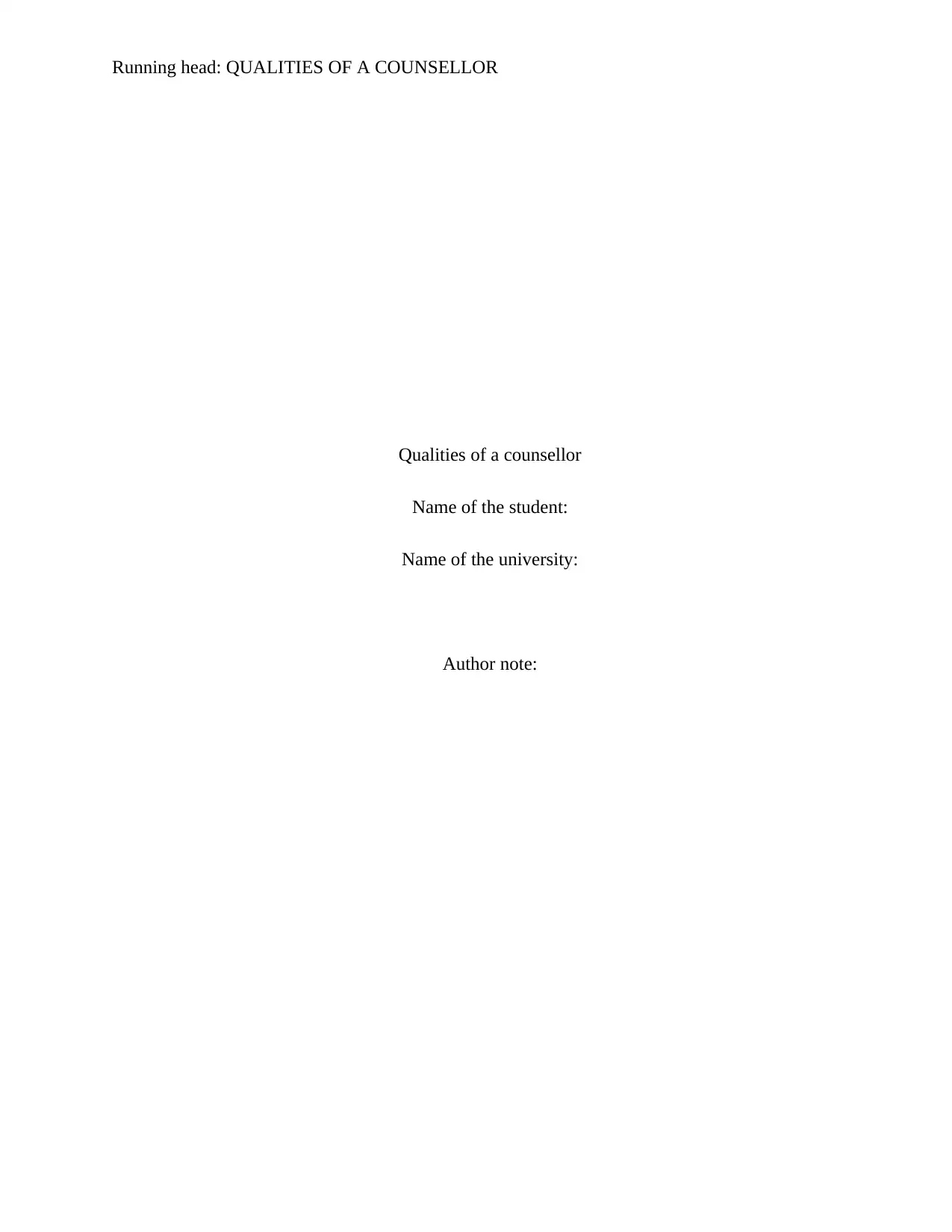
Running head: QUALITIES OF A COUNSELLOR
Qualities of a counsellor
Name of the student:
Name of the university:
Author note:
Qualities of a counsellor
Name of the student:
Name of the university:
Author note:
Paraphrase This Document
Need a fresh take? Get an instant paraphrase of this document with our AI Paraphraser
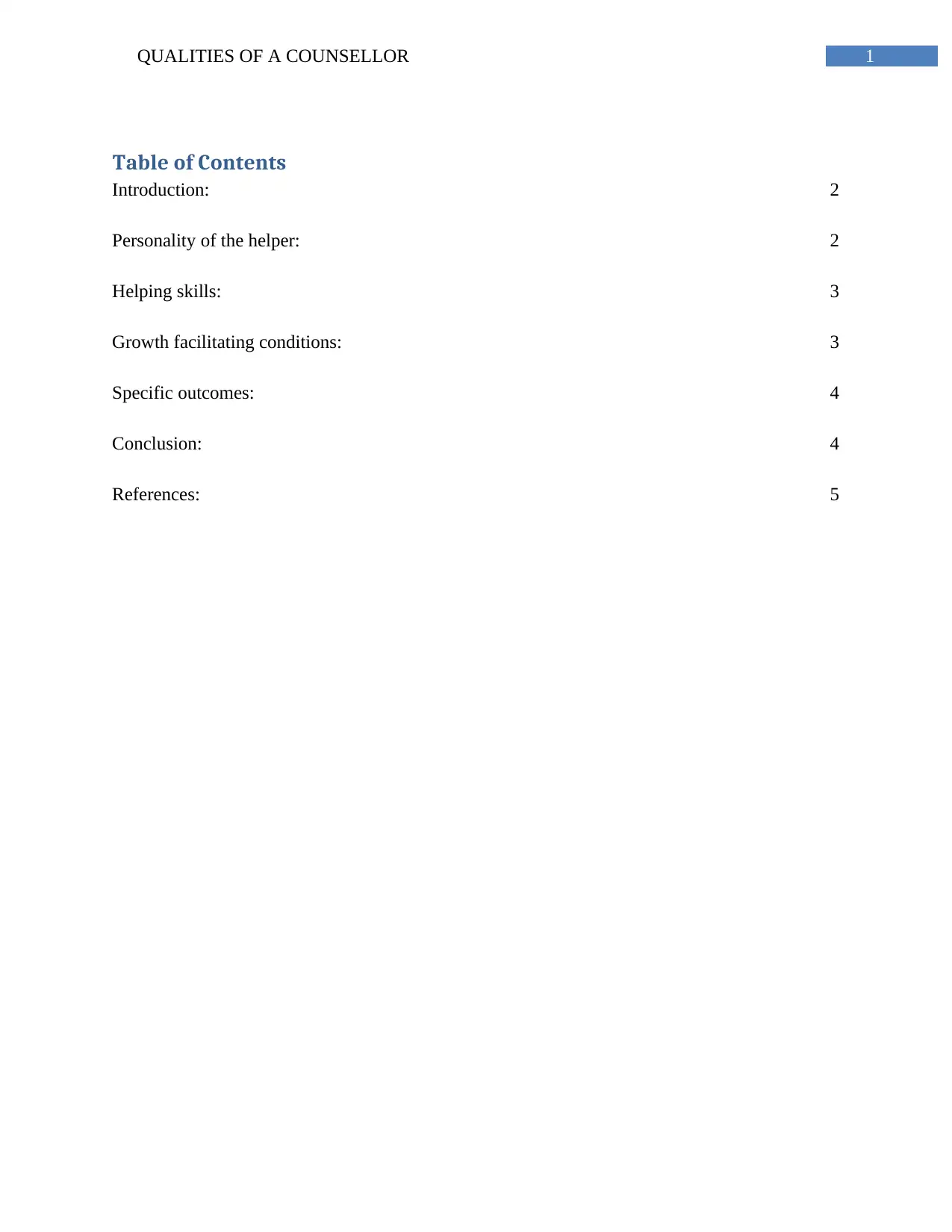
1QUALITIES OF A COUNSELLOR
Table of Contents
Introduction: 2
Personality of the helper: 2
Helping skills: 3
Growth facilitating conditions: 3
Specific outcomes: 4
Conclusion: 4
References: 5
Table of Contents
Introduction: 2
Personality of the helper: 2
Helping skills: 3
Growth facilitating conditions: 3
Specific outcomes: 4
Conclusion: 4
References: 5
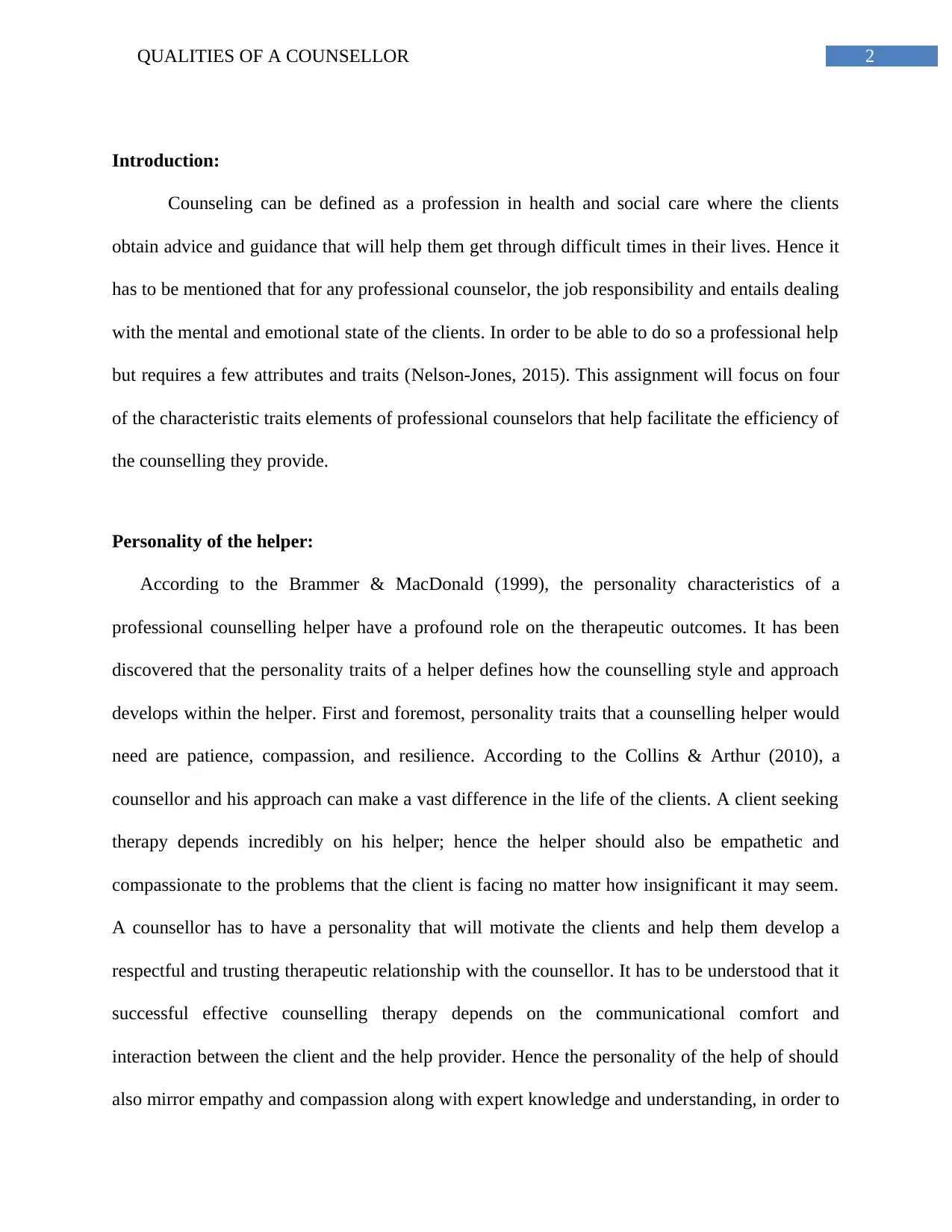
2QUALITIES OF A COUNSELLOR
Introduction:
Counseling can be defined as a profession in health and social care where the clients
obtain advice and guidance that will help them get through difficult times in their lives. Hence it
has to be mentioned that for any professional counselor, the job responsibility and entails dealing
with the mental and emotional state of the clients. In order to be able to do so a professional help
but requires a few attributes and traits (Nelson-Jones, 2015). This assignment will focus on four
of the characteristic traits elements of professional counselors that help facilitate the efficiency of
the counselling they provide.
Personality of the helper:
According to the Brammer & MacDonald (1999), the personality characteristics of a
professional counselling helper have a profound role on the therapeutic outcomes. It has been
discovered that the personality traits of a helper defines how the counselling style and approach
develops within the helper. First and foremost, personality traits that a counselling helper would
need are patience, compassion, and resilience. According to the Collins & Arthur (2010), a
counsellor and his approach can make a vast difference in the life of the clients. A client seeking
therapy depends incredibly on his helper; hence the helper should also be empathetic and
compassionate to the problems that the client is facing no matter how insignificant it may seem.
A counsellor has to have a personality that will motivate the clients and help them develop a
respectful and trusting therapeutic relationship with the counsellor. It has to be understood that it
successful effective counselling therapy depends on the communicational comfort and
interaction between the client and the help provider. Hence the personality of the help of should
also mirror empathy and compassion along with expert knowledge and understanding, in order to
Introduction:
Counseling can be defined as a profession in health and social care where the clients
obtain advice and guidance that will help them get through difficult times in their lives. Hence it
has to be mentioned that for any professional counselor, the job responsibility and entails dealing
with the mental and emotional state of the clients. In order to be able to do so a professional help
but requires a few attributes and traits (Nelson-Jones, 2015). This assignment will focus on four
of the characteristic traits elements of professional counselors that help facilitate the efficiency of
the counselling they provide.
Personality of the helper:
According to the Brammer & MacDonald (1999), the personality characteristics of a
professional counselling helper have a profound role on the therapeutic outcomes. It has been
discovered that the personality traits of a helper defines how the counselling style and approach
develops within the helper. First and foremost, personality traits that a counselling helper would
need are patience, compassion, and resilience. According to the Collins & Arthur (2010), a
counsellor and his approach can make a vast difference in the life of the clients. A client seeking
therapy depends incredibly on his helper; hence the helper should also be empathetic and
compassionate to the problems that the client is facing no matter how insignificant it may seem.
A counsellor has to have a personality that will motivate the clients and help them develop a
respectful and trusting therapeutic relationship with the counsellor. It has to be understood that it
successful effective counselling therapy depends on the communicational comfort and
interaction between the client and the help provider. Hence the personality of the help of should
also mirror empathy and compassion along with expert knowledge and understanding, in order to
⊘ This is a preview!⊘
Do you want full access?
Subscribe today to unlock all pages.

Trusted by 1+ million students worldwide
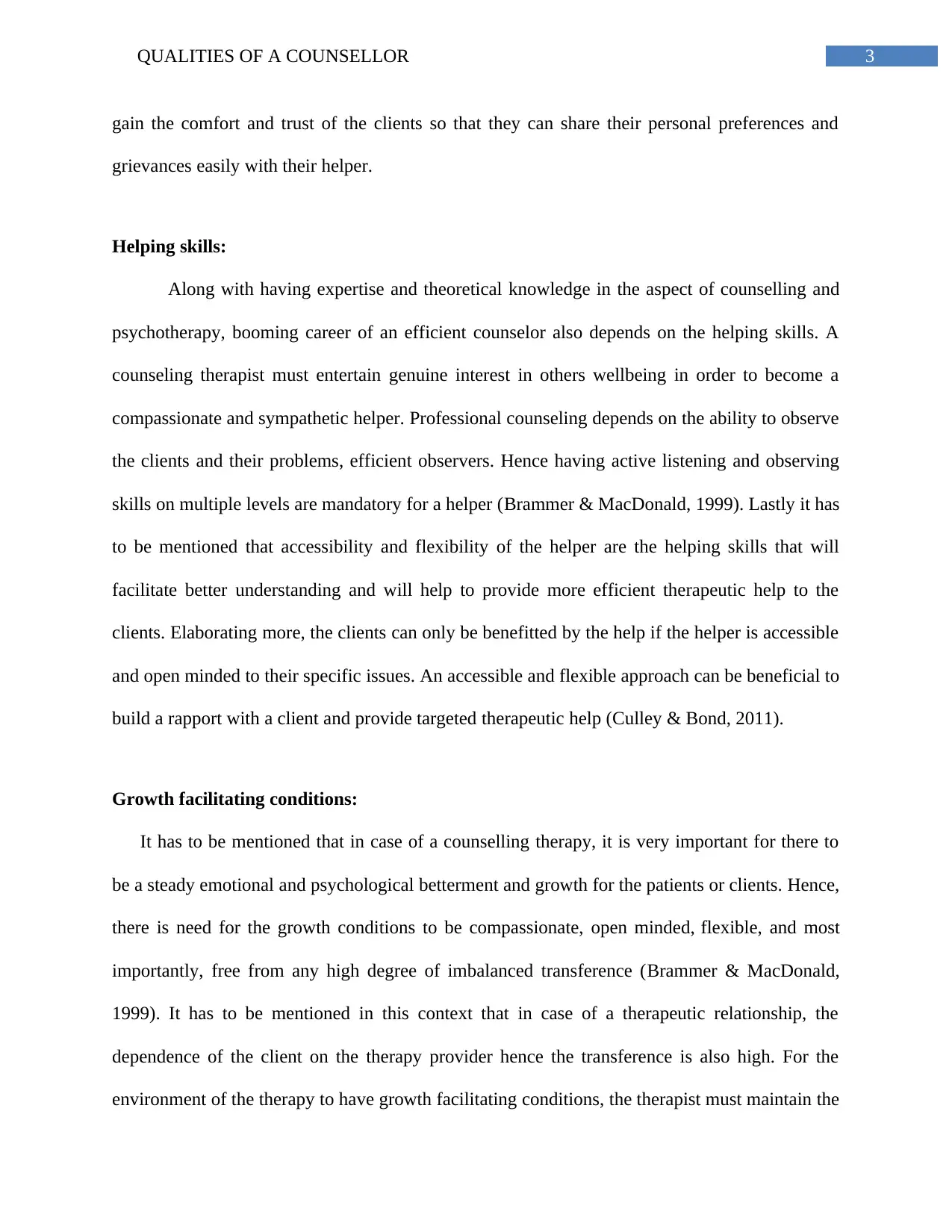
3QUALITIES OF A COUNSELLOR
gain the comfort and trust of the clients so that they can share their personal preferences and
grievances easily with their helper.
Helping skills:
Along with having expertise and theoretical knowledge in the aspect of counselling and
psychotherapy, booming career of an efficient counselor also depends on the helping skills. A
counseling therapist must entertain genuine interest in others wellbeing in order to become a
compassionate and sympathetic helper. Professional counseling depends on the ability to observe
the clients and their problems, efficient observers. Hence having active listening and observing
skills on multiple levels are mandatory for a helper (Brammer & MacDonald, 1999). Lastly it has
to be mentioned that accessibility and flexibility of the helper are the helping skills that will
facilitate better understanding and will help to provide more efficient therapeutic help to the
clients. Elaborating more, the clients can only be benefitted by the help if the helper is accessible
and open minded to their specific issues. An accessible and flexible approach can be beneficial to
build a rapport with a client and provide targeted therapeutic help (Culley & Bond, 2011).
Growth facilitating conditions:
It has to be mentioned that in case of a counselling therapy, it is very important for there to
be a steady emotional and psychological betterment and growth for the patients or clients. Hence,
there is need for the growth conditions to be compassionate, open minded, flexible, and most
importantly, free from any high degree of imbalanced transference (Brammer & MacDonald,
1999). It has to be mentioned in this context that in case of a therapeutic relationship, the
dependence of the client on the therapy provider hence the transference is also high. For the
environment of the therapy to have growth facilitating conditions, the therapist must maintain the
gain the comfort and trust of the clients so that they can share their personal preferences and
grievances easily with their helper.
Helping skills:
Along with having expertise and theoretical knowledge in the aspect of counselling and
psychotherapy, booming career of an efficient counselor also depends on the helping skills. A
counseling therapist must entertain genuine interest in others wellbeing in order to become a
compassionate and sympathetic helper. Professional counseling depends on the ability to observe
the clients and their problems, efficient observers. Hence having active listening and observing
skills on multiple levels are mandatory for a helper (Brammer & MacDonald, 1999). Lastly it has
to be mentioned that accessibility and flexibility of the helper are the helping skills that will
facilitate better understanding and will help to provide more efficient therapeutic help to the
clients. Elaborating more, the clients can only be benefitted by the help if the helper is accessible
and open minded to their specific issues. An accessible and flexible approach can be beneficial to
build a rapport with a client and provide targeted therapeutic help (Culley & Bond, 2011).
Growth facilitating conditions:
It has to be mentioned that in case of a counselling therapy, it is very important for there to
be a steady emotional and psychological betterment and growth for the patients or clients. Hence,
there is need for the growth conditions to be compassionate, open minded, flexible, and most
importantly, free from any high degree of imbalanced transference (Brammer & MacDonald,
1999). It has to be mentioned in this context that in case of a therapeutic relationship, the
dependence of the client on the therapy provider hence the transference is also high. For the
environment of the therapy to have growth facilitating conditions, the therapist must maintain the
Paraphrase This Document
Need a fresh take? Get an instant paraphrase of this document with our AI Paraphraser
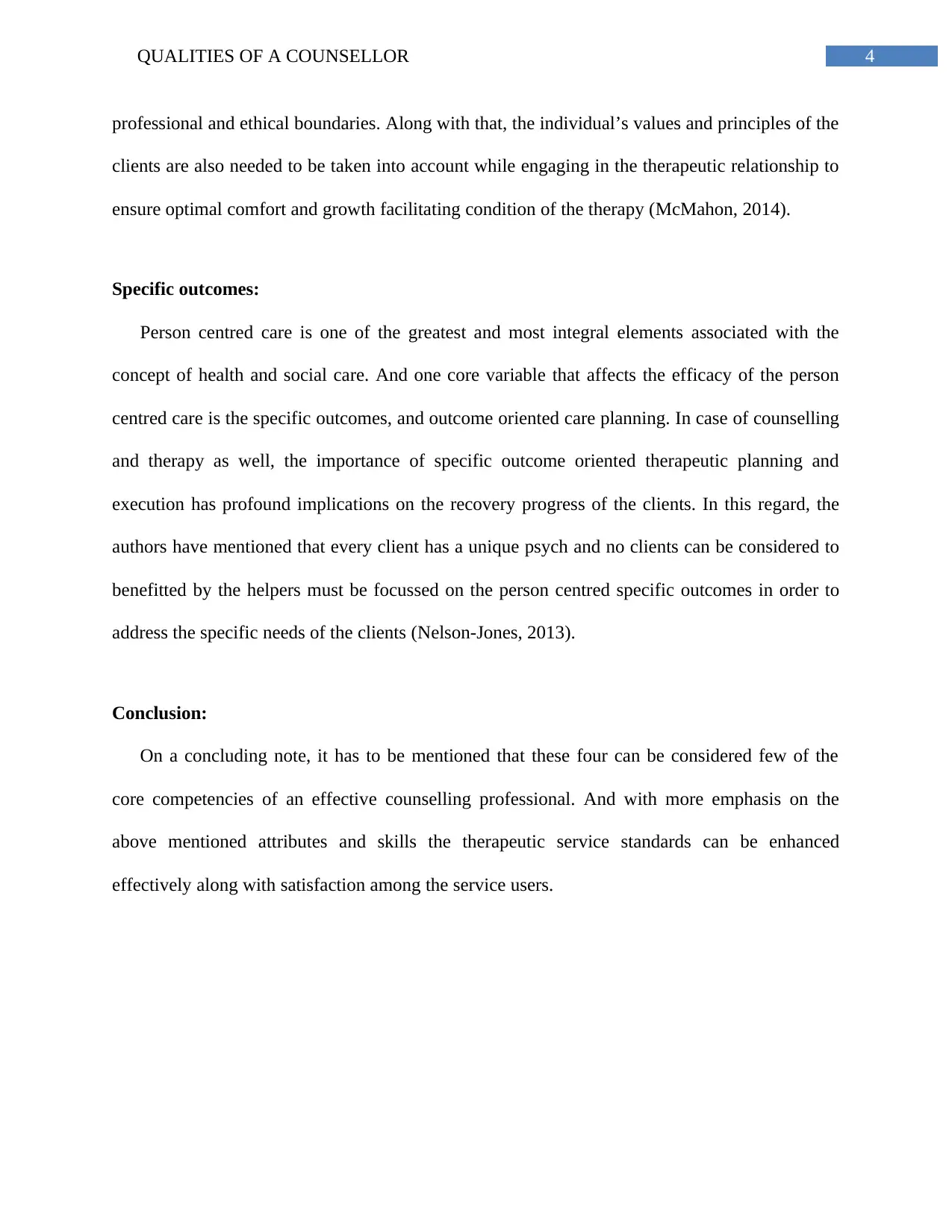
4QUALITIES OF A COUNSELLOR
professional and ethical boundaries. Along with that, the individual’s values and principles of the
clients are also needed to be taken into account while engaging in the therapeutic relationship to
ensure optimal comfort and growth facilitating condition of the therapy (McMahon, 2014).
Specific outcomes:
Person centred care is one of the greatest and most integral elements associated with the
concept of health and social care. And one core variable that affects the efficacy of the person
centred care is the specific outcomes, and outcome oriented care planning. In case of counselling
and therapy as well, the importance of specific outcome oriented therapeutic planning and
execution has profound implications on the recovery progress of the clients. In this regard, the
authors have mentioned that every client has a unique psych and no clients can be considered to
benefitted by the helpers must be focussed on the person centred specific outcomes in order to
address the specific needs of the clients (Nelson-Jones, 2013).
Conclusion:
On a concluding note, it has to be mentioned that these four can be considered few of the
core competencies of an effective counselling professional. And with more emphasis on the
above mentioned attributes and skills the therapeutic service standards can be enhanced
effectively along with satisfaction among the service users.
professional and ethical boundaries. Along with that, the individual’s values and principles of the
clients are also needed to be taken into account while engaging in the therapeutic relationship to
ensure optimal comfort and growth facilitating condition of the therapy (McMahon, 2014).
Specific outcomes:
Person centred care is one of the greatest and most integral elements associated with the
concept of health and social care. And one core variable that affects the efficacy of the person
centred care is the specific outcomes, and outcome oriented care planning. In case of counselling
and therapy as well, the importance of specific outcome oriented therapeutic planning and
execution has profound implications on the recovery progress of the clients. In this regard, the
authors have mentioned that every client has a unique psych and no clients can be considered to
benefitted by the helpers must be focussed on the person centred specific outcomes in order to
address the specific needs of the clients (Nelson-Jones, 2013).
Conclusion:
On a concluding note, it has to be mentioned that these four can be considered few of the
core competencies of an effective counselling professional. And with more emphasis on the
above mentioned attributes and skills the therapeutic service standards can be enhanced
effectively along with satisfaction among the service users.
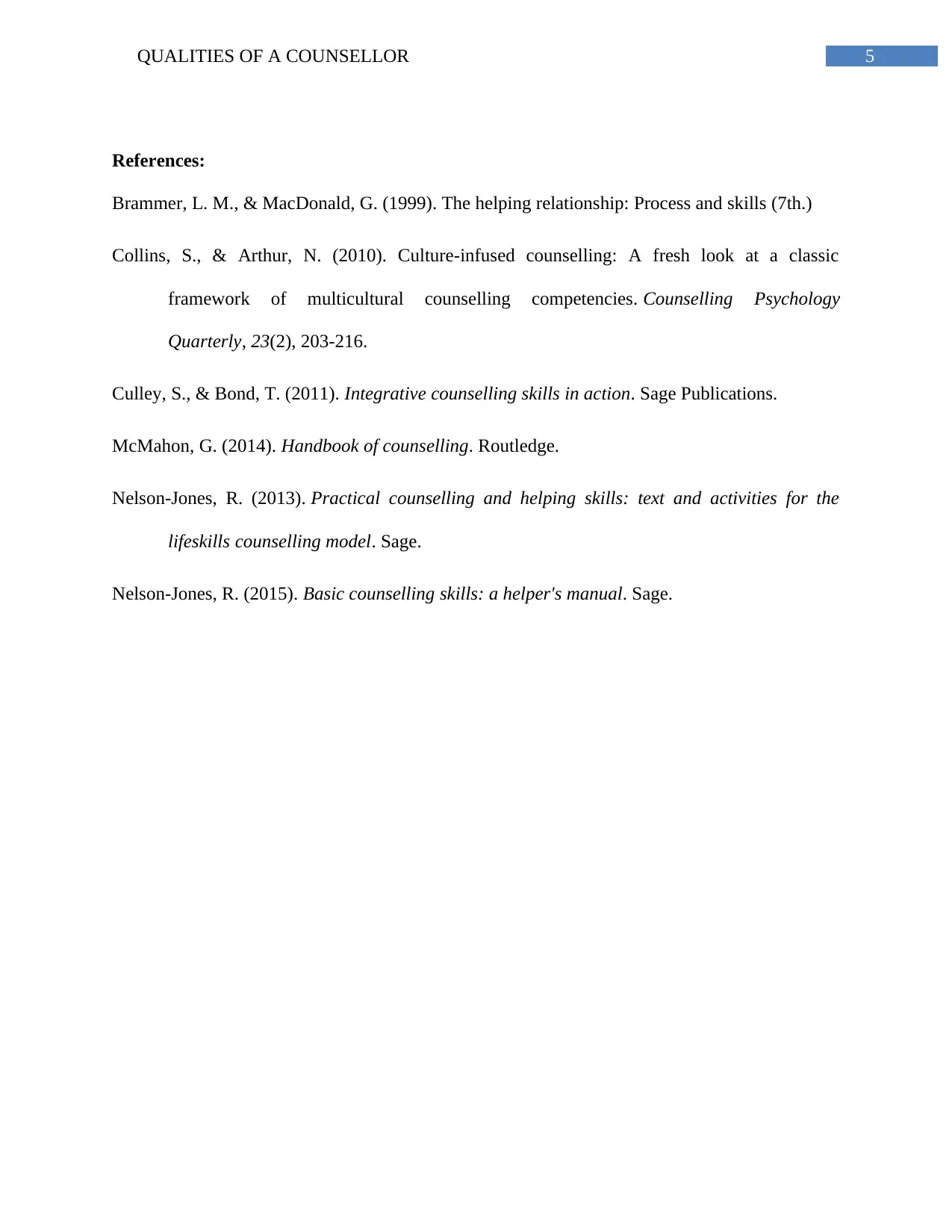
5QUALITIES OF A COUNSELLOR
References:
Brammer, L. M., & MacDonald, G. (1999). The helping relationship: Process and skills (7th.)
Collins, S., & Arthur, N. (2010). Culture-infused counselling: A fresh look at a classic
framework of multicultural counselling competencies. Counselling Psychology
Quarterly, 23(2), 203-216.
Culley, S., & Bond, T. (2011). Integrative counselling skills in action. Sage Publications.
McMahon, G. (2014). Handbook of counselling. Routledge.
Nelson-Jones, R. (2013). Practical counselling and helping skills: text and activities for the
lifeskills counselling model. Sage.
Nelson-Jones, R. (2015). Basic counselling skills: a helper's manual. Sage.
References:
Brammer, L. M., & MacDonald, G. (1999). The helping relationship: Process and skills (7th.)
Collins, S., & Arthur, N. (2010). Culture-infused counselling: A fresh look at a classic
framework of multicultural counselling competencies. Counselling Psychology
Quarterly, 23(2), 203-216.
Culley, S., & Bond, T. (2011). Integrative counselling skills in action. Sage Publications.
McMahon, G. (2014). Handbook of counselling. Routledge.
Nelson-Jones, R. (2013). Practical counselling and helping skills: text and activities for the
lifeskills counselling model. Sage.
Nelson-Jones, R. (2015). Basic counselling skills: a helper's manual. Sage.
⊘ This is a preview!⊘
Do you want full access?
Subscribe today to unlock all pages.

Trusted by 1+ million students worldwide
1 out of 6
Your All-in-One AI-Powered Toolkit for Academic Success.
+13062052269
info@desklib.com
Available 24*7 on WhatsApp / Email
![[object Object]](/_next/static/media/star-bottom.7253800d.svg)
Unlock your academic potential
Copyright © 2020–2025 A2Z Services. All Rights Reserved. Developed and managed by ZUCOL.


